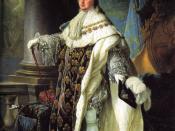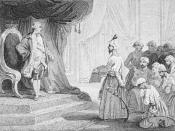The French revolution took place in France from 1789 to 1792, during the reign of King Louis XVI. It was an expression of discontent from the poor towards the rich, and of how they thought France was governed unfairly. The revolution is considered one of the most important events in human history, as it has continued to shape societies and the ways we live today (Cody, 2008). Through examining political, economical, social and cultural factors that led up to the French Revolution, this essay aims at evaluating the extent King Louis XVI was responsible for the event. Although he was responsible in some aspects, such as his ignorance towards the discontent of the Third Estate, King Louis cannot be held fully responsible for the French Revolution.
Many long-term and short-term causes led up to the French Revolution; we will now look at some of the main ones to better understand Louis XVIÃÂs situation and analyze his actions.
Long-term factors include the deteriorating economic situation at the time, the rising population in France, and the new ideas of the Enlightenment that influenced the French peopleÃÂs thinking. All of these had led to the peopleÃÂs discontent, especially with the economic crisis, as they could barely support their families in face of the rising food costs and unemployment. Riots such as the Reveillon riot broke out (Hetherton 1992, pg. 24). Some of the short-term causes include the wars with Britain from 1756 to 1763 and from 1778 to 1783 (Lavelle, 2008), the meeting of the Estates General and the failure of the King to secure support from the church and the aristocrats, especially on financial and political matters (Waugh 2002, pg. 89). There were also two major events that triggered the start of the French revolution: the Tennis Court Oath and...


